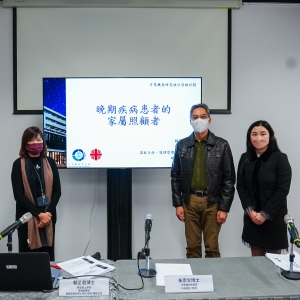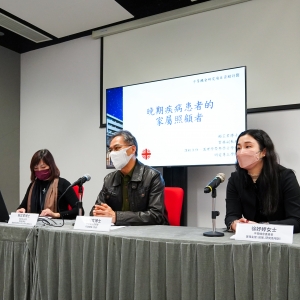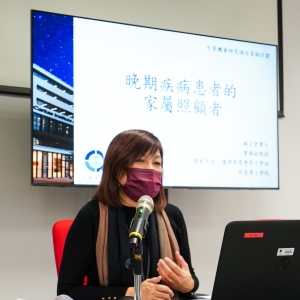


The widespread of COVID-19 in the past few years posed challenges for carers because many support activities and respite care options ceased or being postponed. Carers were required to be separated from the person they cared for. The level of stress of caregivers who need to support relatives with advanced disease at home during the pandemic situation in Hong Kong is uncertain.
Dr. Theresa LAI Tze Kwan, Associate Professor of Practice, Programme Leader of Bachelor of Nursing (Honours) (Academic), from School of Health Sciences of Caritas Institute of Higher Education, conducted the study on "Family Caregivers of Persons with Advanced Illnesses" which aims to (i) determine the high-risk factors of caregiver stress in Hong Kong; (ii) investigate the relationship amongst the caregiver stress, care recipients' illness and the employer support; and (iii) explore any difference in types of caregiver stress between employed and unemployed caregivers by means of questionnaire survey and in-depth interviews.
This study is funded by the 2020/21 round of the Funding Programme of Research Projects on Equal Opportunities of the Equal Opportunities Commission (EOC).
Results and Findings
Characteristics of the participants
This study was conducted from February to September 2021. A total 409 eligible participants who were caregivers of patients with advanced diseases participated in this study. The findings showed that most of the caregivers were female (70.7%). Most of the caregivers were aged over 50 years old (75.3%) and married (67.5%). Half of them had higher diploma level or above (51.8%) and were taking care of their parents or parents-in-law (56.7%).
This study involved 205 at-work and 204 not-at-work caregivers. The 205 working caregivers included mainly employees (73.2%). More than half of them (62.0%) were working over 40 hours per week on top of their care responsibilities. For the not-at-work caregivers, they were mainly housekeepers (38.2%) and retired persons (54.4%).
Characteristics and illnesses of care recipients
Most of the care recipients were aged over 60 years old (79.7%). Major diagnoses were degenerative illness (40.6%), advanced cancer (38.6%), end-stage organ failure (17.1%) and others (3.7%). Other illnesses included uncontrolled diabetes mellitus, severe chronic obstructive pulmonary disease and psychiatric illness. Regarding self-care ability, 35.2% of care recipients were totally dependent, and 28.4% of them had a great difficulty in self-care.
Time spent in care recipients
The average time spent in tending to the care recipients per week was 40.60 hours per week with a median of 21 hours per week. A significant difference was found amongst major illness groups in the time spent in tending to the care recipients. The results revealed that the caregivers of advance cancer patients spent longer hours in care than degenerative illness group, end-stage organ failure group and other illness group.
A significant difference was observed amongst economic activity status groups in the time spent in taking care of the recipients. The results revealed that the caregivers of not-at-work group (mean = 54.33) spent longer hours in care than at-work group (mean=26.93). Within the not-at-work group, housekeepers (mean = 61.45) and unemployed (mean= 60.00) spent more time in taking care of the recipients. In the at-work group, self-employed persons (mean = 35.22) spent more time in taking care of the recipients.
Common assisted activities and supports
The majority of caregivers accompanied their care recipients for medical consultation (81.9%), provided emotional support (65.3%), assisted in grocery shopping (62.8%), assisted in dining or prepared food for the care recipients (59.4%), performed housework (54.3%), assisted mobility (53.1%), provided financial support (44.7%), etc.
Perceived stress level
The findings of this study showed that the mean of caregiver stress level (measured in Kingston Caregiver Stress Scale) was 25.85. A significant difference was found between major illness groups and stress level in several stress items of the scale. These items were 'Change in relationship with spouse or relatives', 'Conflicts with family over care decisions' and 'Conflicts with family over the support you are receiving'. The perceived stress in other major illness group (mean = 27.67) was higher than that in degenerative illness group (mean = 26.43), advanced cancer group (mean = 25.54) and end-stage organ failure group (mean = 24.86).
A significant difference was observed amongst economic activity status groups for two stress items. The items were 'Feeling of being overwhelmed, overworked, or overburdened' and 'Conflict with previous daily commitments'. The results revealed that self-employed and housekeepers had higher stress level.
Relationship amongst caregiver demographic, time spent and stress level
The results of this study revealed that the stress level of the caregiver was positively correlated with the time spent in the care recipient. Time spent in care recipients was positively correlated with the age of caregiver and negatively correlated with monthly household income and the age of care recipient.
Workplace environment
The findings of this study revealed that most of the working participants (79.6%) experienced extra work stress for caregiving, and more than one-third of them (36.9%) thought that discrimination against caregivers is common in the workplace of Hong Kong. Many participants (75.8%) had experiences in applying or using carer-friendly policies in their workplace.
Care issues
Among the 336 responded respondents, 70.8% of them reported 275 care issues with most concern, which included feelings and emotion, information need, family and social issues, community resources, caregivers' ability and tangible support.
Extra stress during the pandemic situation
Among the 341 responded respondents, 222 (65.1%) of them expressed their extra stress during the pandemic period.
Care responsibilities and working environment
Regarding care responsibilities, three major problems were mostly encountered by the participants, which included service accessibility, caring roles and role conflicts, and self-development. Most of the working participants reflected no carer-friendly policies or any caregiving benefits in their workplace. Common barriers faced by the caregivers were difficulties in daily care and transportation. The participants suggested that tangible support, leave arrangement and use of technologies were major areas that can be improved.
Conclusion and Recommendation
The findings of this study showed that self-employed and housekeeping persons experienced higher stress level. Caregivers who were female, unemployed, housekeeping person and caring for people with advanced cancer were prone to spend more time in the care issues. Moreover, concerns regarding the future care needs of spouse / relative, feelings of being confined by responsibilities or demands, and lack of confidence in care ability caused higher stress level amongst different sources of stress items. The overall stress level was positively correlated with the time spent in care activities. Based on the key findings of this study and the expert opinion in the related fields, the following key recommendations are suggested.
Recommendation 1 – Hospital Authority, Department of Health, Social Welfare Department or NGOs to develop a comprehensive website or app as a reliable platform for the available services and enhance the availability of community resources.
Recommendation 2 – Introduce the concept of household equipment libraries by government department (e.g. Electrical and Mechanical Services Department) or NGOs with installing and maintenance services to suit the needs of the care recipients in the rapid change of physical conditions and ensure the safety operations.
Recommendation 3 – Increase the supply of special wheelchair taxi, accessible hire car and private non-emergency ambulance booking services by NGOs and commercial partners. Further develop telemedicine services by Hospital Authority for patients with relatively stable condition to attend follow-up consultations.
Recommendation 4 – Early referral of palliative home care services and set up a designated hotline operated by a group of experienced home care nurses and social workers by Hospital Authority with the access of clinical management system and electronic Health Record Sharing System, which allow them to have better understanding of patient's updated medical condition and provide the most appropriate advice.
Recommendation 5 – Increase appropriate training to both formal and informal carers of the patient with advanced illnesses by qualitied institutes, such as NGOs.
Recommendation 6 – Labour Department should set guidelines for employers to build a caregiver-friendly workplace. The Government should take the lead and be a role model of developing policy for the caregiver-friendly workplace.
Recommendation 7 – Separate the queue for care services for patients with less common advance illnesses and life expectancy less than one year.
For media enquiries, kindly contact:
Public Affairs Office
Caritas Institute of Higher Education
3653 6745 / 6045 0593
pao@sfu.edu.hk